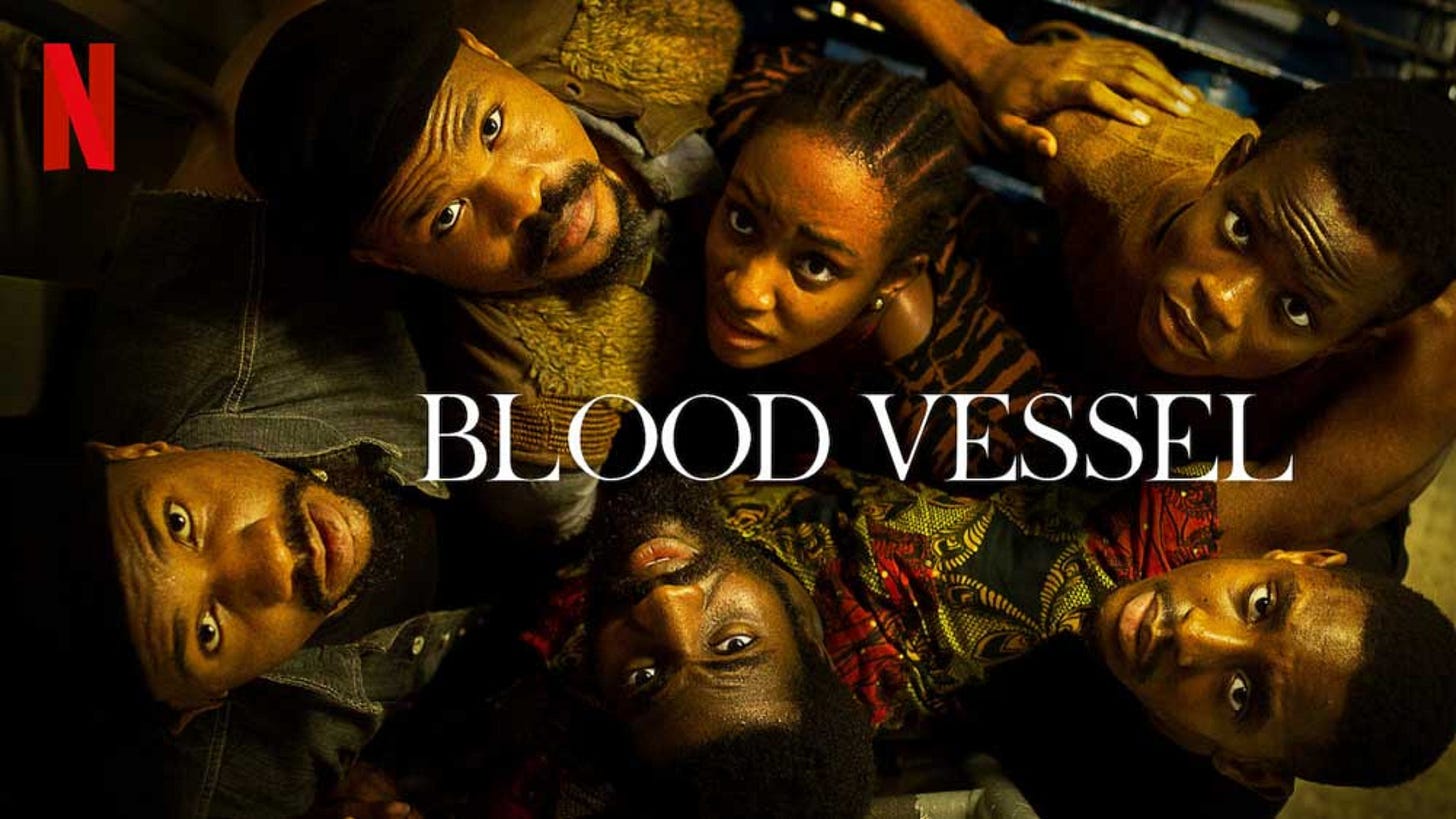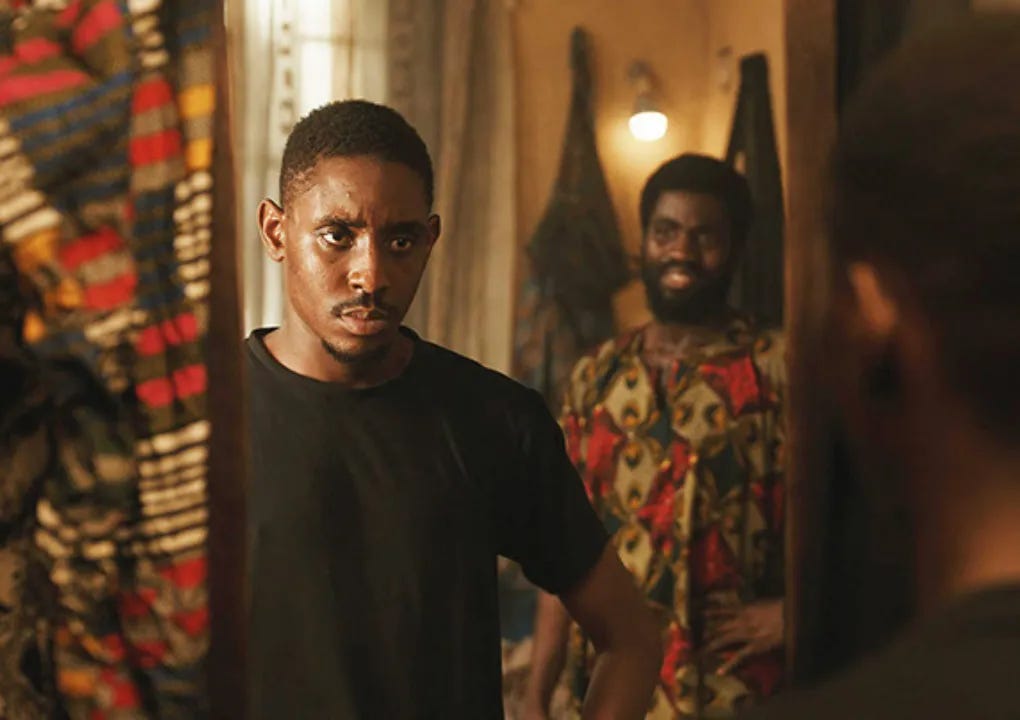Blood Vessel: Navigating Love in Troubled Waters
How does Play Network Studios' first "original" story compare to its previous films?
Directed by: Moses Inwang
Story by: Charles “of Play” Okpaleke
Screenplay by: Musa Jeffrey David
Starring: David Ezekiel, Adaobi Dibor, Sylvester Ekanem, Obinna Christian Okenwa, Alex Cyr Budin, Jidekene Achufusi, Levi Chikere, and many more.
After four active years in the filmmaking business, it’s about time whoever is still sitting on the fence accepts that there’s no slowing Play Network Studios (PNS) down. Like every new entity that bursts into the scene hoping to make a name for itself, PNS, too, has had its fair share of wins and misses. In just four years of operation, the studio has produced five movies to its name, with Blood Vessel being its sixth and more on the way. It has also racked up an impressive count of award nominations and wins enough to make older production houses green with envy.
What’s the secret to Play Network Studios’ success in such a short time, you might ask. I believe it’s Executive Producer and CEO Charles Okpaleke, whose ambition and his willingness and capability to pour his weight and resources into his projects is an open secret at this point. Simply put, it is why Play Network Studios’ movies are easily recognized by their flamboyant production quality and marketing PR, which mirror Okpaleke’s real-life status.
Until now, Play Network Studios’ productions have all been remakes of existing, popular Nollywood IPs. Blood Vessel is the first one to toe a different path with a story that is relatively original. This is the first thing that is striking about the movie and sets it apart from its predecessors. What else is new? What does it get right? What does it get wrong? And, how does it compare when stacked up against the other movies under the Play umbrella? We get into all of that in this review.
Brought together by chance, six people fleeing a town devastated by oil pollution stow away on a mysterious ship -not realizing the dangers that await.
Set against the backdrop of chaos in Nigeria's oil regions, Blood Vessel dives into Nembe, a community in Bayelsa State where political clashes and youth resistance brew unrest. A soldier has died and, in typical fashion, the Nigerian army demands answers, and even more blood flows. Caught in this mix of chaos and drama are three stray pairs without any prior connection to one another. An interesting act of fate brings them —Boma & Degbe, Abbey & Oyin, Tekena & Olotu— together, uniting them on an unexpected journey aboard a vessel for safety.

What starts as an unfussy premise takes an unexpected turn when the sail commences. The film's tone transforms, and its characters confront a new adversary in Igor and his gang. Murphy's Law takes effect and things start to go from bad to worse as the stowaways are forced to break the one rule set by Oga P, who covertly facilitated their boarding: to not come up to the ship's surface.
Blood Vessel weaves a narrative that echoes familiar themes from history—the complex dynamics between black and white, encompassing stories of slavery, exploitation, and systemic injustice. These themes manifest vividly with the introduction of Igor, the primary antagonist, aboard the ship. Adding depth to the narrative, the film sheds light on the harsh reality faced by those desperate to escape their circumstances, and willing to venture across borders by any means possible for a better life.
Igor, a Russian pirate, is in the midst of a routine trip transporting illegally obtained crude oil from Nigeria to a hinted destination in Brazil. However, his voyage takes an unexpected turn when the stowaways are discovered. This eventful encounter alters the trajectory of Igor's journey, introducing chaos and conflict.
In the realm of acting, Blood Vessel delivers commendable performances, with special recognition for the actors portraying Oyin (Adaobi Dibor), Abbey (David Ezekiel), and Tekena (Sylvester Ekanem). Also noteworthy is the portrayal of Igor. As far as white men starring in Nigerian movies go, Igor's actor (Alex Cyr Budin), on a rating scale, earns a respectable 5 out of 10. Unlike some of his predecessors who typically feel out of place, Budin’s performance integrates into the narrative considerably, enough to make the film work, contributing to the film's overall authenticity. This underscores a significant achievement in the film—its thoughtful casting choices. The main characters, save for Jidekene Achufusi, are not drawn from mainstream circles, yet they prove fitting for their roles, with several delivering some of the finest acting seen in Nollywood this year.
A standout moment in the film unfolds when Abbey and Oyin cross paths for the first time on screen. The scene is charged with passion, capturing the essence of a love not fully realized. As events unfold, Abbey's initial love-struck gaze transforms into panic upon realizing the impending threat from Oyin's father to terminate her pregnancy. The subtlety in these moments is palpable; you can sense the pain in Abbey's eyes, the fleeting pull of helplessness, and the quiet resolve to find a solution. This sequence, occurring early in the film, lays a solid foundation, promising viewers an engaging and emotionally resonant viewing experience.
As there are good moments, so also there are a couple of things I believe the movie could’ve handled better.
In scrutinizing the facets of Blood Vessel that fell short, a recurrent theme emerges—the film's inability to provide satisfying payoffs for its commendable setups. The issue of leaving narrative threads dangling is not unique to Nollywood but is a pervasive challenge. While some filmmakers globally grapple with crafting engaging premises, Nollywood often excels in setting up compelling scenarios only to falter in delivering satisfying resolutions, which is puzzling.
As Blood Vessel navigates from a promising start to the tumultuous journey once Igor discovers the stowaways aboard the ship, the beginning of the end commences. Regrettably, the narrative fails to capitalize on even predictable moments that could evoke emotionally charged responses from the viewers, missing opportunities to harvest the low-hanging fruits of storytelling.
A notable gripe for me involves the way the film poorly introduces important plot points late or not at all. An aspect further highlighting this poor timing issue is evident in Olotu and Tekena’s arc. Ideally, a stronger foundation for the brothers’ rivalry should have been established before their confrontation aboard the ship. Instead, as they engage in a fight orchestrated for Igor’s pleasure, the audience is left perplexed, questioning the origin of Tekena’s intense hatred and anger displayed during the altercation. This additional layer of disjointed storytelling worsens the film’s struggle with integrating crucial elements seamlessly.
A prime example lies in the use of flashbacks to unveil Oyin's backstory, an effort to shed light on her father's character and deepen her connection with Abbey. While the intention is commendable, the execution falls short. These flashback sequences often feel shoehorned, prioritizing convenience over a smooth integration into the main storyline. Whether it's the seemingly unnecessary Igbo Landing-esque sequence, functioning more as a teaser for a future project than an integral part of the current narrative, or the belated revelation about Oyin being a child of the water goddess, the execution leaves a bitter aftertaste. The incorporation of these flashbacks could have significantly benefited from a more organic blend into the primary narrative, highlighting a missed opportunity for a cohesive storytelling experience.
There are more bones to pick with Blood Vessel; I summarize them below:
Abbey’s abrupt transformation into a superpowered James Bond-esque figure feels unearned, lacking the narrative groundwork necessary for such a character arc.
A perplexing aspect of the plot is the scant justification for the stowaways' choice of the perilous sea journey. More could have been done by the narrative to convincingly articulate why they opt for the uncertainty of a new land via the sea when safer alternatives on land, such as relocation to a different community like Lagos, seem more plausible.
Igor, the primary antagonist, emerges as a villain lacking depth and coherent motivations. The film falters in providing sufficient insight into why he acts the way he does. Questions abound about Oga P's repercussions for bringing the stowaways on board, the surprising reactions of Igor's goons to his behavior, his unwarranted obsession with deciphering whether the stowaways were spies, and why a crime boss of his supposed magnitude would let his girlfriend off the ship that easily. All these conflicting acts leave too much to the imagination, leaving critical narrative gaps.
These specific issues don’t break Blood Vessel beyond redemption, but they do significantly undermine the cohesiveness of the movie’s narrative structure, contributing to a less-than-satisfactory viewing experience.
Blood Vessel undeniably stands as a testament to ambitious filmmaking, boasting a production scale that transcends the ordinary around here. The movie is easily one of Play Network Studios' better endeavors since the remarkable Living in Bondage: Breaking Free in 2019, commanding attention through its bold premise.
However, a noteworthy shortcoming becomes apparent as the film unfolds — a disheartening realization that, for all its grandeur and initial semblance of having something profound to say, Blood Vessel ultimately falls short of delivering the substantive narrative it initially hints at. The movie's ambitious scale and promising start, while commendable, leave a lingering sense of untapped potential and a desire for more substantive storytelling that aligns with its grandeur.
In simpler words: Even though Blood Vessel starts off looking like it has something profound to say, it ends up saying very little. I still think you should see it; if not for anything, for the acting performance of its cast.
Rinzy’s Rating: 3/5 (C)
Random musings
If the captain of the ship was tied up, who was steering all along?
I wonder why the movie skipped showing how Igor’s men confronted the remaining stowaways in their hideout. That would’ve been an engaging sequence to watch.
For someone who made a lot of noise, Degbe turned out to be stupid. It didn't take much for him to get his mouth running like a fool once caught. 😂
In loving memory of Sylvester Eka Nem (Tekena). May your soul shine bright as the artistry you've graced us with here. Continue to rest in peace, champ.








It is hard to not be angry with the people who green-lit this story at PNS after seeing the movie. It was an absolute waste of my time, especially because it started off with so much promise, getting me fully invested. But right from where the film was supposed to kick off fully, everything began falling apart. Flashy but said nothing in the end. An empty vessel!